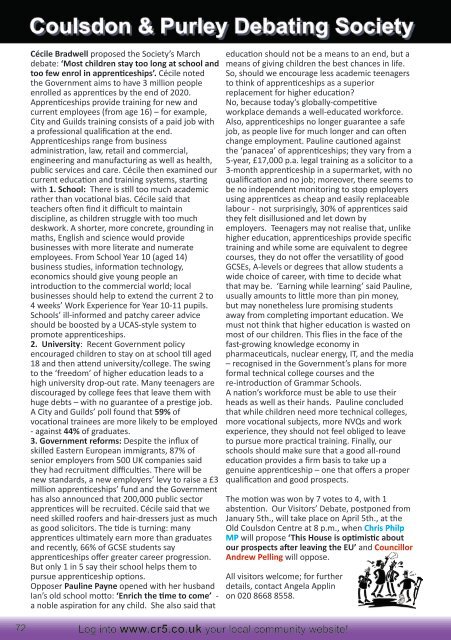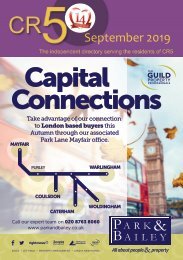CR5 Issue 143 April 2017
A free monthly magazine delivered to 11,200 homes and businesses in the CR5 postcode. Contains local business advertising, interesting reads, local news, Community What's On and prize competitions.
A free monthly magazine delivered to 11,200 homes and businesses in the CR5 postcode. Contains local business advertising, interesting reads, local news, Community What's On and prize competitions.
Create successful ePaper yourself
Turn your PDF publications into a flip-book with our unique Google optimized e-Paper software.
Cécile Bradwell proposed the Society’s March<br />
debate: ‘Most children stay too long at school and<br />
too few enrol in apprenticeships’. Cécile noted<br />
the Government aims to have 3 million people<br />
enrolled as apprentices by the end of 2020.<br />
Apprenticeships provide training for new and<br />
current employees (from age 16) – for example,<br />
City and Guilds training consists of a paid job with<br />
a professional qualification at the end.<br />
Apprenticeships range from business<br />
administration, law, retail and commercial,<br />
engineering and manufacturing as well as health,<br />
public services and care. Cécile then examined our<br />
current education and training systems, starting<br />
with 1. School: There is still too much academic<br />
rather than vocational bias. Cécile said that<br />
teachers often find it difficult to maintain<br />
discipline, as children struggle with too much<br />
deskwork. A shorter, more concrete, grounding in<br />
maths, English and science would provide<br />
businesses with more literate and numerate<br />
employees. From School Year 10 (aged 14)<br />
business studies, information technology,<br />
economics should give young people an<br />
introduction to the commercial world; local<br />
businesses should help to extend the current 2 to<br />
4 weeks’ Work Experience for Year 10-11 pupils.<br />
Schools’ ill-informed and patchy career advice<br />
should be boosted by a UCAS-style system to<br />
promote apprenticeships.<br />
2. University: Recent Government policy<br />
encouraged children to stay on at school till aged<br />
18 and then attend university/college. The swing<br />
to the ‘freedom’ of higher education leads to a<br />
high university drop-out rate. Many teenagers are<br />
discouraged by college fees that leave them with<br />
huge debts – with no guarantee of a prestige job.<br />
A City and Guilds’ poll found that 59% of<br />
vocational trainees are more likely to be employed<br />
- against 44% of graduates.<br />
3. Government reforms: Despite the influx of<br />
skilled Eastern European immigrants, 87% of<br />
senior employers from 500 UK companies said<br />
they had recruitment difficulties. There will be<br />
new standards, a new employers’ levy to raise a £3<br />
million apprenticeships’ fund and the Government<br />
has also announced that 200,000 public sector<br />
apprentices will be recruited. Cécile said that we<br />
need skilled roofers and hair-dressers just as much<br />
as good solicitors. The tide is turning: many<br />
apprentices ultimately earn more than graduates<br />
and recently, 66% of GCSE students say<br />
apprenticeships offer greater career progression.<br />
But only 1 in 5 say their school helps them to<br />
pursue apprenticeship options.<br />
Opposer Pauline Payne opened with her husband<br />
Ian’s old school motto: ‘Enrich the time to come’ -<br />
a noble aspiration for any child. She also said that<br />
education should not be a means to an end, but a<br />
means of giving children the best chances in life.<br />
So, should we encourage less academic teenagers<br />
to think of apprenticeships as a superior<br />
replacement for higher education?<br />
No, because today’s globally-competitive<br />
workplace demands a well-educated workforce.<br />
Also, apprenticeships no longer guarantee a safe<br />
job, as people live for much longer and can often<br />
change employment. Pauline cautioned against<br />
the ‘panacea’ of apprenticeships; they vary from a<br />
5-year, £17,000 p.a. legal training as a solicitor to a<br />
3-month apprenticeship in a supermarket, with no<br />
qualification and no job; moreover, there seems to<br />
be no independent monitoring to stop employers<br />
using apprentices as cheap and easily replaceable<br />
labour - not surprisingly, 30% of apprentices said<br />
they felt disillusioned and let down by<br />
employers. Teenagers may not realise that, unlike<br />
higher education, apprenticeships provide specific<br />
training and while some are equivalent to degree<br />
courses, they do not offer the versatility of good<br />
GCSEs, A-levels or degrees that allow students a<br />
wide choice of career, with time to decide what<br />
that may be. ‘Earning while learning’ said Pauline,<br />
usually amounts to little more than pin money,<br />
but may nonetheless lure promising students<br />
away from completing important education. We<br />
must not think that higher education is wasted on<br />
most of our children. This flies in the face of the<br />
fast-growing knowledge economy in<br />
pharmaceuticals, nuclear energy, IT, and the media<br />
– recognised in the Government’s plans for more<br />
formal technical college courses and the<br />
re-introduction of Grammar Schools.<br />
A nation’s workforce must be able to use their<br />
heads as well as their hands. Pauline concluded<br />
that while children need more technical colleges,<br />
more vocational subjects, more NVQs and work<br />
experience, they should not feel obliged to leave<br />
to pursue more practical training. Finally, our<br />
schools should make sure that a good all-round<br />
education provides a firm basis to take up a<br />
genuine apprenticeship – one that offers a proper<br />
qualification and good prospects.<br />
The motion was won by 7 votes to 4, with 1<br />
abstention. Our Visitors’ Debate, postponed from<br />
January 5th., will take place on <strong>April</strong> 5th., at the<br />
Old Coulsdon Centre at 8 p.m., when Chris Philp<br />
MP will propose ‘This House is optimistic about<br />
our prospects after leaving the EU’ and Councillor<br />
Andrew Pelling will oppose.<br />
All visitors welcome; for further<br />
details, contact Angela Applin<br />
on 020 8668 8558.<br />
72 Log into www.cr5.co.uk your local community website!

















